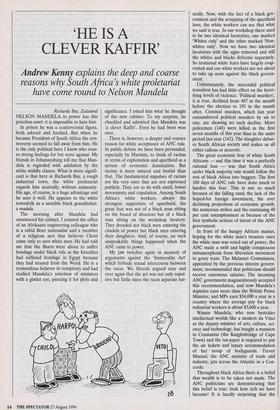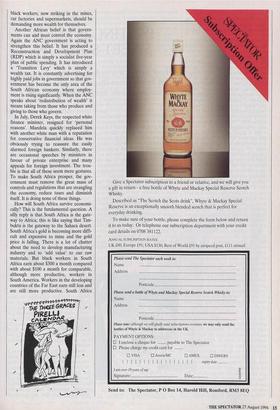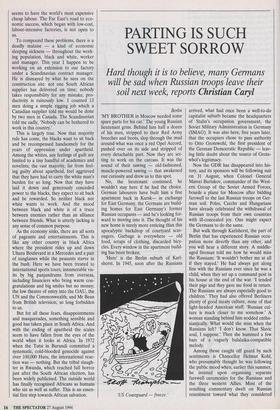`HE IS A CLEVER KAFFIR'
Andrew Kenny explains the deep and coarse
reasons why South Africa's white proletariat have come round to Nelson Mandela
Richards Bay, Zululand NELSON MANDELA in power has this priceless asset: it is impossible to hate him.
In prison he was a controversial figure, both adored and loathed. But when he became President of South Africa the con- troversy seemed to fall away from him. He is the only political hero I know who rous- es strong feelings for but none against. My friends in Johannesburg tell me that Man- dela is regarded with adulation by the white middle classes. What is more signifi- cant is that here in Richards Bay, a rough industrial town, the white proletariat regards him neutrally, without animosity. His age, of course, is a huge advantage and he uses it well. He appears to the white townsfolk as a sensible black grandfather, a madala.
The morning after Mandela had announced his cabinet, I entered the office of an Afrikaans engineering colleague who is a rabid Boer nationalist and a member of a religious sect that believes Christ came only to save white men. He had told me that the Boers were about to suffer bondage under black rule as the Israelites had suffered bondage in Egypt because they had strayed from the Word. He is a tremendous believer in conspiracy and had studied Mandela's selection of ministers with a gimlet eye, piercing it for plots and significance. I asked him what he thought of the new cabinet. To my surprise, he chuckled and admitted that Mandela was `a clever Kaffir'. Even he had been won over.
There is, however, a deeper and coarser reason for white acceptance of ANC rule. In public debate we have been persuaded, especially by Marxists, to think of racism in terms of exploitation and apartheid as a system of economic domination. But racism is more natural and bestial than that. The fundamental impulses of racism are the very ones that are not expressed publicly. They are to do with smell, bowel movements and copulation. Among South Africa's white workers, always the strongest supporters of apartheid, the great fear was not of a black man sitting on the board of directors but of a black man sitting on the workshop lavatory. They dreaded not black men entering the citadels of power but black men entering their daughters. And, of course, no such unspeakable things happened when the ANC came to power.
My jaw twitches again in memory of arguments against the 'Immorality Act' which forbade sexual intercourse between the races. We liberals argued over and over again that the act was not only repul- sive but futile since the races separate nat- urally. Now, with the fact of a black gov- ernment and the scrapping of the apartheid laws, the white workers can see that what we said is true. In our workshop there used to be two identical lavatories, one marked `Whites only' and the other marked 'Non- whites only'. Now we have two identical lavatories with the signs removed and still the whites and blacks defecate separately. So irrational white fears have largely evap- orated and our white workers are not about to take up arms against the black govern- ment.
Unfortunately, the successful political transition has had little effect on the horri- fying levels of violence. 'Political murders', it is true, declined from 487 in the month before the election to 195 in the month after. Criminal murders, which last year outnumbered political murders by six to one, are showing no such decline. More policemen (148) were killed in the first seven months of this year than in the same period last year (142). The slaughter debas- es South African society and makes us all either callous or neurotic.
The great economic fear of white South Africans — and this time it was a perfectly rational fear — was that South Africa under black majority rule would follow the rest of black Africa into beggary. The first 100 days of ANC rule have done much to harden this fear. This is not so much because of the falling rand, the lack of the hoped-for foreign investment, the ever declining projections of economic growth, the numerous strikes and the continuing 40 per cent unemployment as because of the first symbolic actions of intent of the ANC government.
In front of the hungry African masses, hoping for the white man's treasure once the white man was voted out of power, the ANC made a swift and highly conspicuous metamorphosis from liberation movement to gravy train. The Melamet Commission, appointed by the previous interim govern- ment, recommended that politicians should receive enormous salaries. The incoming ANC government magnanimously accepted this recommendation, and now Mandela's deputies earn more than the British Prime Minister, and MPs earn $54,000 a year in a country where the average pay for black industrial workers is about $3,600 a year.
Winnie Mandela, who now bestrides intellectual worlds like a modern da Vinci as the deputy minister of arts, culture, sci- ence and technology, has bought a mansion in Constantia (the Knightsbridge of Cape Town) and the tax-payer is required to pay the air tickets and luxury accommodation of her troop of bodyguards. Trevor Manuel, the ANC minister of trade and industry, jets across the Atlantic in a Con- corde.
Throughout black Africa there is a belief that wealth is to be taken not made. The ANC politicians are demonstrating that this belief is true: look how rich we have become! It is hardly surprising that the black workers, now striking in the mines, car factories and supermarkets, should be demanding more wealth for themselves.
Another African belief is that govern- ments can and must control the economy. Again the ANC government is acting to strengthen this belief. It has produced a Reconstruction and Development Plan (RDP) which is simply a socialist five-year plan of public spending. It has introduced a 'Transition Levy' which is simply a wealth tax. It is constantly advertising for highly paid jobs in government so that gov- ernment has become the only area of the South African economy where employ- ment is rising significantly. When the ANC speaks about 'redistribution of wealth' it means taking from those who produce and giving to those who govern.
In July, Derek Keys, the respected white finance minister, resigned for 'personal reasons'. Mandela quickly replaced him with another white man with a reputation for conservative financial ideas. He was obviously trying to reassure the easily alarmed foreign bankers. Similarly, there are occasional speeches by ministers in favour of private enterprise and many appeals for foreign investment. The trou- ble is that all of these seem mere gestures. To make South Africa prosper, the gov- ernment must remove the great mass of controls and regulations that are strangling the economy, reduce taxes and diminish itself. It is doing none of these things.
How will South Africa survive economi- cally? This is the fundamental question. A silly reply is that South Africa is the gate- way to Africa; this is like saying that Tim- buktu is the gateway to the Sahara desert. South Africa's gold is becoming more diffi- cult and expensive to mine and the gold price is falling. There is a lot of chatter about the need to develop manufacturing industry and to 'add value' to our raw materials. But black workers in South Africa earn about $300 a month compared with about $100 a month for comparable, although more productive, workers in South America. Workers in the developing countries of the Far East earn still less and are still more productive. South Africa seems to have the world's most expensive cheap labour. The Far East's road to eco- nomic success, which began with low-cost, labour-intensive factories, is not open to us.
To compound these problems, there is a deadly malaise — a kind of economic sleeping sickness — throughout the work- ing population, black and white, worker and manager. This year I happen to be working on an extension to our factory under a Scandinavian contract manager. He is dismayed by what he sees on the construction site: not one South African supplier has delivered on time; nobody takes responsibility for any mistake; pro- ductivity is ruinously low. I counted 13 men doing a simple rigging job which a Canadian supplier told me would be done by two men in Canada. The Scandinavian told me sadly, 'Nobody can be bothered to work in this country.'
This is largely true. Now that majority rule has come, the blacks want to sit back and be recompensed handsomely for the years of oppression under apartheid. Among the whites, any feelings of guilt are limited to a tiny handful of academics and novelists; the vast majority, far from feel- ing guilty about apartheid, feel aggrieved that they have had to carry the white man's burden for so long. Now that they have laid it down and generously conceded power to the blacks, they expect to sit back and be rewarded. So neither black nor white wants to work. And the mood between black and white is of a truce between enemies rather than an alliance between friends. What is utterly lacking is any sense of common purpose.
As the economy sinks, there are all sorts of pageants and entertainments. This is like any other country in black Africa where the president rides up and down Uhuru Boulevard in a Mercedes and a pair of sunglasses while the peasants starve in the bush. Here we have been treated to international sports tours; innumerable vis- its by big panjandrums from overseas, including financiers who bring warm con- gratulations and big smiles but no money; the low theatre of entry into the OAU, the UN and the Commonwealth; and Mr Bean from British television, so long forbidden to us.
But for all these fears, disappointments and masquerades, something sensible and good has taken place in South Africa. And with the ending of apartheid the scales seem to have fallen from the eyes of the world when it looks at Africa. In 1972 when the Tutsi in Burundi committed a systematic, cold-blooded genocide against over 100,000 Hutu, the international reac- tion was — nothing. But the tribal slaugh- ter in Rwanda, which reached full horror just after the South African election, has been widely publicised. The outside world has finally recognised Africans as humans who sin as well as suffer. This is an essen- tial first step towards African salvation.




























































 Previous page
Previous page